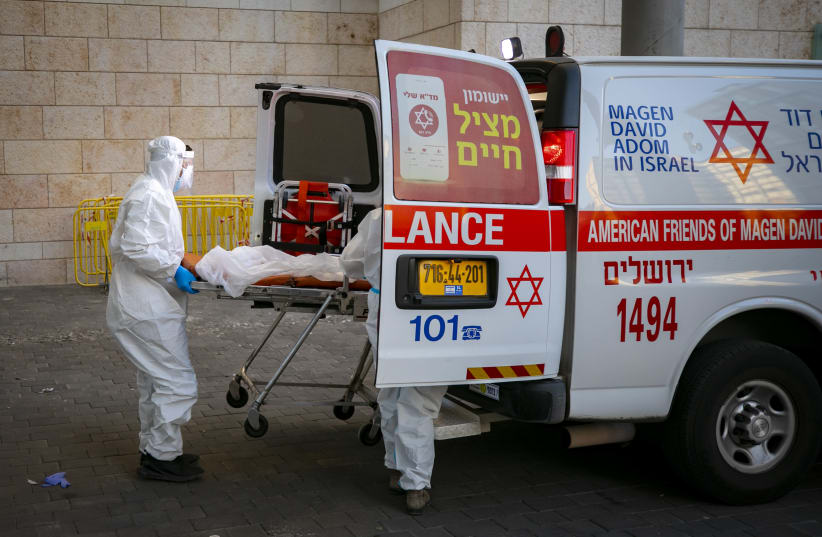Israel will lift almost all the remaining coronavirus restrictions starting on June 1, the Health Ministry announced Sunday night. The number of active cases in Israel has dropped to 500, compared with 88,000 at the peak of the pandemic, it said.
In light of the significant drop in morbidity, Health Ministry Yuli Edelstein said the ministry would not seek to renew regulations that require businesses and venues to operate either under the Green Pass or the Purple Standard systems, which are due to expire on May 31.
The question of whether to eliminate the obligation to wear a mask indoors is currently being debated by experts and officials. A decision is expected within the next few days or weeks.
“Israel is going back to normal,” Edelstein said. “Less than half a year ago we started the vaccination campaign. Thanks to the excellent work of the health system – health funds, hospitals, MDA, Magen Israel and employees of the Health Ministry – and thanks to the amazing mobilization of Israeli citizens, we have carried out the best vaccination campaign in the world.”
“All along, the Health Ministry has formulated an outline for a gradual and careful opening of the economy, which has allowed us to maintain low morbidity data over time,” he said. “Now, to my delight, it is possible from a health point of view to eliminate the need for a Green Pass and the limitations of the Purple Ribbon. The economy and the citizens of Israel will receive extra air to breathe.”
The authorities will continue to monitor the situation, and if the morbidity rate rises again, it will be necessary to reintroduce restrictions, Edelstein said.
The restrictions regarding airports and traveling are going to remain in place, he said.
Edelstein called on Israelis to avoid traveling to countries with high morbidity.
Argentina, Seychelles and Russia were included in the list of countries under a severe travel warning, the Health Ministry announced earlier on Sunday. If the situation does not improve, they might be placed under a complete travel ban together with India, Ukraine, South Africa, Mexico, Turkey and Ethiopia, which Israelis are prohibited from visiting, it said.
As coronavirus cases continue to drop, can Israel hope to become COVID-free?
It is unlikely, according to experts. But the situation remains promising, said Tomer Lotan, executive director of the National Coronavirus Task Force.
“For the past few days, on average, we have identified some 25 to 30 new cases a day,” he said. “Of those, some five or six come from abroad.”
Even though the number of airline passengers who have coronavirus is small compared with the thousands of travelers, it is important to maintain a good policy for those arriving from abroad, Lotan said.
“I believe our currently policy is good, but there is room for improvement,” he said.
The Health Ministry has been working for months to implement a program that would require those entering quarantine to wear an electronic bracelet upon arrival to monitor their compliance.
While relevant legislation has been passed, the program has not yet been implemented.
“Because we have no functioning government or Knesset, there is not much progress yet, but we have asked the Knesset Arrangement Committee to assign a relevant committee to authorize it,” Lotan said.
As the first groups of foreign tourists are set to start visiting the country in the next few days, and more nations are opening up to Israeli visitors, it will be very important to manage the borders well, he said.
It is hard to believe that Israel will become COVID-free, Lotan said.
“We are not an island,” he said. “People come in through its borders, and there is the Palestinian Authority. A certain number of infected people will continue to come in.”
Prof. Cyrille Cohen, head of Bar-Ilan University’s Laboratory of Tumor Immunology and Immunotherapy, said: “I think that we will have a situation similar to the one we have with other diseases, including measles or chicken pox, where from time to time we see a case or a small outbreak.”
“In addition, as COVID becomes rarer, people might not go and get tested if they have some symptoms, as it happens with the flu,” he said. “When we have the flu, we do not go to get a PCR test to find out which strain of the virus we are infected with.”
Israel’s current situation is promising, Cohen said.
“We can safely say that after Purim, Passover and Lag Ba’omer, with the schools completely open, the situation is really good,” he said. “The only thing that I find puzzling is that the number of patients in serious condition has not decreased for the past two weeks or so.”
As of Sunday morning, 60 people were listed in serious condition, compared with 141 four weeks earlier and almost 1,200 in the worst weeks of the crisis.
The R rate, which measures the average number of people each virus carrier will infect, has slightly increased to 0.94 in the past few days, after weeks of holding stable at 0.7-0.8. That is a little surprising, but it might be due to the very low number of cases found during this period, Cohen said.
“If one day some 20 cases are found, and the following day 30, the R rate will increase, even if the numbers remain very small,” he said.
A R rate under 1 shows that the pandemic is receding, although at a slower place.
It is important to continue to protect Israel from variants, “even though the available data shows that the vaccine is quite effective against them,” Cohen said.
Meanwhile, the Health Ministry said it has resumed formulating a policy to vaccinate children 12 to 15 years old, and it expects to reach a final decision within the next 10 days.
